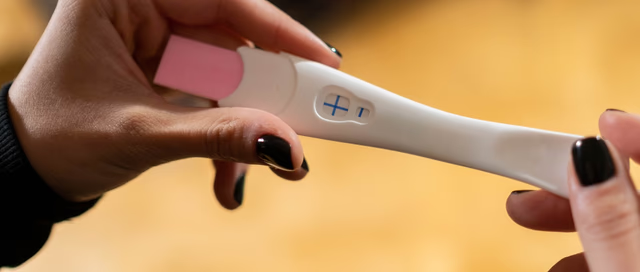
How to cope with repeated pregnancy loss
Peer reviewed by Dr Sarah Jarvis MBE, FRCGPLast updated by Lydia SmithLast updated 3 Apr 2018
Having a miscarriage can be a devastating experience which brings a range of difficult feelings, from shock and grief to loss and anxiety.
For some women, the next pregnancy will be successful. But for others, miscarriage happens time and time again. Around one in 100 women experience repeated pregnancy loss, defined as the loss of three or more pregnancies in a row.
In this article:
Amy Swales, 35, has experienced pregnancy loss five times. The first occurred in 2015, six months after she and her husband decided to start a family.
"We had about two weeks to get our heads around the positive pregnancy test, something that felt life-changing, before a trip to the bathroom changed everything again," she says. "It was a lot to take in. First A&E, then the early pregnancy clinic the following day where the sonographer told me my uterus was completely empty."
On this first occasion, Swales had experienced an ectopic pregnancy, a complication in which the embryo attaches outside the uterus, which had resolved itself without need for intervention - a rare occurrence. An ectopic pregnancy, which occurs in around 11 in 1,000 pregnancies, is a medical emergency which can be life-threatening if not treated quickly, as surgery may be needed.
"For me, the loss was twofold - not only the pregnancy and the new life we were only just beginning to get our heads around, but the loss of what I perceived everyone else got to do: the happy scan, the surprise announcement."
Swales lost her second pregnancy with a miscarriage while on holiday in New York. "It floored us both," she says. "The overriding emotions were guilt, anger and bitterness, piled on top of the gutting sadness we both felt."
Continue reading below
The psychological impact
Although everyone will experience the emotional aftermath of a miscarriage differently, common feelings include fear, sadness, anger, confusion and guilt.
"Each new pregnancy brings both hope and anxiety, and each new loss may be harder to bear, especially as many women may feel that time is running out," says Juanita Charles, of the charity Miscarriage Association. "There may also be a sense that life is on hold, while they try and try again for a baby."
Research by Imperial College London has shown four in 10 women experience symptoms of post-traumatic stress disorder (PTSD) after a miscarriage, such as flashbacks to the experience, nightmares and even avoiding people or places which remind them of the traumatic event.
"After the third loss, I was in a really bad place," Swales says. "I couldn't concentrate on conversations with friends; I didn't want to socialise because it was harder and harder to pretend to be fine. I cried before I went to sleep, and barely slept anyway - my mind would replay every detail of our experiences over and over."
Patient picks for Bleeding in pregnancy
What causes miscarriage?
After three or more miscarriages, you will usually be offered tests and a scan to try to identify the problem.
"Known causes of multiple pregnancy loss include: antiphospholipid syndrome (APS) - a blood clotting problem which is the most important treatable cause of recurrent miscarriage; other blood clotting problems - such as inherited blood disorders - can cause recurrent miscarriage, particularly after 14 weeks; abnormal chromosomes or cervical weakness," Charles says.
"Less common causes include an abnormally shaped uterus, immune problems, poorly controlled diabetes and undiagnosed thyroid problems."
Although it's natural to want to find a cause and solution, this isn't always possible. More than half of couples who have investigations for recurrent miscarriage don't end up with a clear answer - but this may mean there is a good chance of the next pregnancy being successful without any treatment.
Only you can decide if the time is right to try again, but it is still likely that you will go on to have a healthy, successful pregnancy the next time.
According to the charity Tommy's, the risk of another loss is 35% after three previous miscarriages. Looking at the positives, that means a 65% chance that you will not experience another pregnancy loss.
There's no one-size-fits-all approach when it comes to dealing with miscarriage, but getting access to the right support can help you cope with difficult emotions and feelings.
Continue reading below
Where to go for support
Speaking to someone knowledgeable about pregnancy loss can help you process your thoughts and feelings.
"The Miscarriage Association offers emotional support and information to anyone who has suffered or is affected by pregnancy loss, via our helpline, online support and support groups," Charles says.
Tommy's can also put you in touch with one of their midwives free of charge, who are trained in bereavement support.
Access counselling or therapy
"If you're worried that you or your partner are having problems coping with grief, you may need further treatment and counselling," Charles says.
Your GP can advise on the best treatment for you, whether that is counselling or talking therapies.
"Talking therapies, such as cognitive behavioural therapy, have been successful at treating PTSD," Charles says. "However further investigation into how this treatment should be tailored to women who have suffered an early pregnancy loss and/or repeated losses is needed."
The British Association for Counselling and Psychotherapy (BACP) can also help you find a registered professional therapist.
In the UK, you can find bereavement support services in your area via the NHS website.
Remember grief affects everyone differently
Not everyone experiences miscarriage in the same way. Take time off work if you need to, or get extra help at home if you are struggling to cope.
"Everyone is different and there is no set pattern or time limit. Grief and sadness may last a lot longer, or much less time, than people expect," Charles says.
"Pregnancy loss is a different kind of loss. It's not like grieving for someone you know. Instead women or couples may mourn the loss of their baby's future and their own future as the baby's parents. Even when people start to feel better there may still be some tough times."
Continue reading below
Speak to others
"Talking to other couples who have suffered miscarriage can also help and there is peer support available," Charles says, such as the stillbirth and neonatal death charity Sands.
"The difference 'going public' made to my mental health was incredible," Swales says. "Firstly, opening ourselves up to support from others trumped any lingering grief over not getting this three-month surprise announcement I'd been hanging on to and secondly, the reassurance gained from connecting with others can't be underestimated."
She has even written about her experiences and worked with charities to raise awareness of miscarriage.
"The sheer volume of people, both friends and strangers, who told us both they'd been through it and felt exactly the same was overwhelming," she says.
"Knowing that validated our feelings and removed a lot of the harmful, painful guilt. It eases our heartbreak to think of the people who say our honesty and willingness to speak helped them - the cliché of something good coming from something bad is true, and it genuinely helps."
Article History
The information on this page is written and peer reviewed by qualified clinicians.
3 Apr 2018 | Latest version
3 Apr 2018 | Originally published

Feeling unwell?
Assess your symptoms online for free

